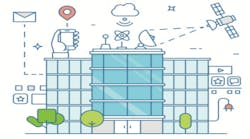How proptechs accelerate growth using IoT-connectivity solutions
By Louis Vermorel, CEO of Wattsense
Interoperability is a constant challenge for proptechs when deploying their smart-building services. How do different equipment and brands connect, communicate and exchange data without restriction? How to deploy your app when there's no BMS access, or even worse, no BMS at all?
Interoperability becomes more intricate when devices from various manufacturers and protocols have to be coordinated with technical standards such as Modbus, KNX or BACnet.
Buildings connectivity is essential for all proptechs
Many operators and technicians working for FM companies or property owners still use manual methods to collect and confirm the data they rely on to manage a building’s temperature, energy, layout and maintenance schedules.
Buildings account for approximately 40% of global energy consumption. Proptechs that focus on energy efficiency, predictive maintenance, and smart buildings play an essential role in improving our cities and how our buildings operate. But the trick is that when proptechs deploy their smart-building applications, they encounter incompatible technology, proprietary protocols, and messy BMS networks that can take a lot of hours and money to untangle.
The long hours of development needed to create an interoperable connector just for the deployment of smart-building products would increase prices and take the focus away from the proptechs’ core offering.
IoT solutions for building connectivity
IoT-connectivity solutions help proptechs transform traditional buildings into smart ones by serving as an abstraction layer between buildings' complex IT structures and the proptechs’ services. This allows communication between all types of equipment, centralizing data, enabling analysis, making buildings more efficient, and reducing pollution.
When IoT technology was not very mature, Delphis, an HVAC efficiency proptech, decided to build a whole building-management stack on their own, as they couldn't find a trustworthy and affordable third-party platform.
"We learned that a building-management technology stack involves at least three layers (equipment connectivity, semantics and analytics), and it is very hard to excel in all of them. Having a connectivity solution focusing only on equipment connectivity took a big burden out of our backs and helped us accelerate the core features of our offering," explained Thanos Daskalopoulos, chief innovation officer at Delphis.
Current IoT solutions looking to bring new technologies into buildings should offer interoperability, plug-and-play installations, user-friendly consoles with no programming skills required, and lower operational costs.
How to deploy a smart-building app with no BMS access
The main obstacle to deploying a smart-building app in a building with no BMS or no access to the BMS is the lack of interoperability between the building equipment and the application. The solution? The Internet of Things (IoT), which enables connectivity between devices.
Using remotely managed interoperable IoT devices that serve as gateways, proptechs can easily access a BMS or create a BMS-like network to collect data, visualize graphs, set up alarms, control equipment through the cloud, and deploy smart-building integrations that will modernize the building.
IoT solutions can easily integrate energy-monitoring solutions and quickly share data on-site, on the cloud, or on a hyper-vision system to ensure data analysis. These features enable properties to be modernized cost-effectively, saving weeks of deployment and reducing operating costs. And some solutions can communicate with all types of building equipment by unifying field-communication protocols.
IoT solutions open the door to many smart-building applications with intuitive platforms that improve everything from day-to-day building management to implementing long-term energy and comfort strategies.



